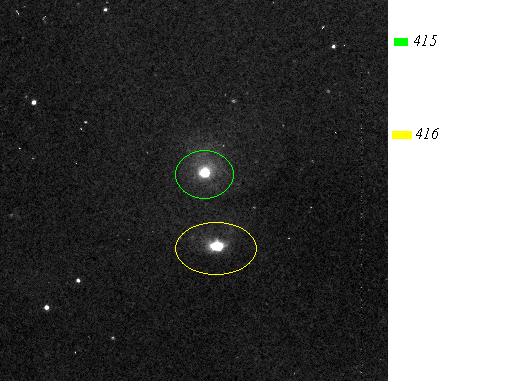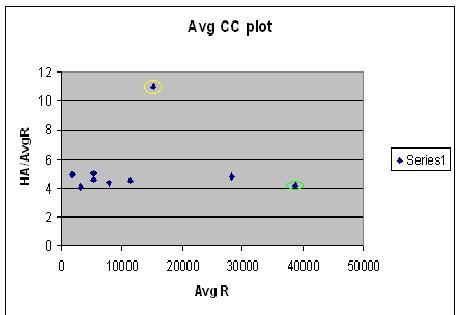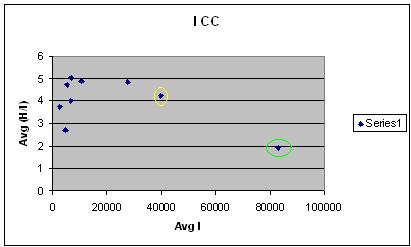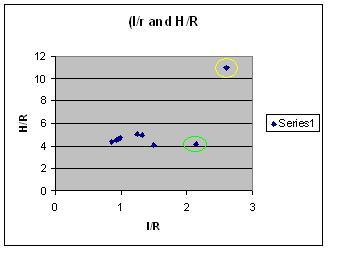Talk:Kitt Peak H-alpha Data
--NicholasJamesKelley 07:20, 22 December 2007 (PST) H-Alpha images taken with the Kitt Peak Observatory has been Beneficial because it allows us to see Active Stars, T-Tauris' fortunately are very active. The two targets that I am monitoring are labeled as 415 and 416, and can be seen in this image.
This images alone allows me to make the statement that these objects emit H-Alpha. To take this idea to a new level we have developed a new way to look at H-Alpha intensity in comparision using simple photometry. The work and final products of this new approach are below.
Star 415 (05 07 30.63,-06 11 00.1) 416 (05 07 30.21, -06 10 15.8) ref1 (05 07 46.75, -06 09 10.2 Ref2 (05 07 47.14 -06 09 46.1) ref3 (05 07 37.40 -06 11 43.7) ref4 (05 07 45.95 -06 13 13.2 ref5 (05 07 49.39 -06 11 39.4 ref6 (05 07 46.06 -06 12 20.2 ref7 (05 07 32.54 -06 13 07.0
hA Intensity 415 158647.28 416 167325.391 Ref1 26830.305 Ref2 51520.008 Ref3 9200.643 Ref4 134461.094 Ref5 34399.918 Ref6 24596.813 Ref7 12920.03
R1 R2 R3 R4 415 43521.02 39019.879 39840.48 32770.988 416 13763.399 17767.584 14823.522 14634.927 Ref1 4880.869 5976.293 5184.819 5415.333 Ref2 11846.153 11857.752 11317.155 10557.247 Ref3 2033.761 2071.625 1948.087 1384.457 ref4 29362.744 30389.764 26979.943 26288.033 ref5 7797.505 8393.399 7646.638 7870.902 ref6 6451.765 5386.33 5251.918 4545.934 ref7 2509.687 3354.988 4532.651 2456.102 3/5/2007 2/21/2007 2/27/2007 03/082007
Avg R Ratio(H/AvgR) 38788.09175 4.090102731 15247.358 10.974058 5364.3285 5.001614834 11394.57675 4.521449908 1859.4825 4.947958908 28255.121 4.758822091 7927.111 4.33952773 5408.98675 4.547397532 3213.357 4.020726611
The I band
--NicholasJamesKelley 08:16, 22 December 2007 (PST) This is the same proceedure that i used for for the R band in Comparison to H-Alpha this time though I used the I band as a Comparison.
Star hA Intensity 415 (05 07 30.63,-06 11 00.1) 158647.28 416 (05 07 30.21, -06 10 15.8) 167325.391 ref1 (05 07 46.75 -06 09 10.2 26830.305 Ref2 (05 07 47.14 -06 09 46.1) 51520.008 ref3 (05 07 37.40 -06 11 43.7) 9200.643 ref4 (05 07 45.95 -06 13 13.2) 134461.094 ref5 (05 07 49.39 -06 11 39.4) 34399.918 ref6 (05 07 46.06 -06 12 20.2) 24596.813 ref7 (05 07 32.54 -06 13 07.0) 12920.03
I intensity I intensity I inetensity I intensity 83941.086 82039.164 79750.445 86310.219 38087.754 39591.254 43700.785 37208.473 6738.003 6250.884 6566.5 7151.164 9816.58 10866.196 10564.864 10967.834 2285.85 2566.026 2180.912 2767.535 26221.172 27226.857 27333.27 30301.652 6382.668 7225.333 6022.346 7721.122 4993.719 6441.247 4672.51 4703.471 5098.407 4902.227 4184.837 5040.592 3/12/2007 3/11/2007 3/9/2007 2/21/2007
Avg I Avg H/I 83010.2285 1.911177488 39647.0665 4.220372546 6676.63775 4.018535377 10553.8685 4.881623075 2450.08075 3.75524072 27770.73775 4.841826501 6837.86725 5.030796408 5202.73675 4.727668183 4806.51575 2.688024064
Final Color Color plot
--NicholasJamesKelley 10:03, 22 December 2007 (PST) This is the final product of the other two posts, to understand stand this how this is benificial to my project you must first understand that H-Alpha is contained within the R Band. Therefore if one was to take the ratio of H-Alpha/R than you could seperate out the excess in H-Alpha from the R-Band. By comparing this to I/R we are compareing the amount of H-Alpha given off by an object to how much brighter the object is in the I band compared to the R band. T-Tauris' should not only have an excess in H-Alpha they should also appear brighter in the I band. Because a color color plot done on these two ideas would hopefully show where my targets would fall if it be in the area of a yso or a main sequence star.
As you can see in this plot both targets 415 and 416 both seperate from the other " Normal Stars" This shows that these two are indeed bright in H-Alpha and brighter in the I band than the R band.



